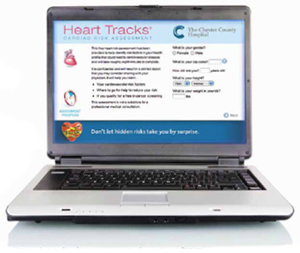
Published: Synapse, 2010 : Vol 1
You've heard about the person who seems to be in perfect health and suffers a life-threatening heart attack. The truth is there are many people who do not realize they are walking around with risk factors that significantly increase their chances of having a heart attack. Moreover, they don't know they could be doing things to lower their risk.
 Cardiologists and other specialists of The Chester County Hospital have joined forces to create an online risk calculator called the "Heart Tracks® Cardiac Risk Assessment" to help you quickly and easily identify your current and future risk for heart disease. Available at www.chestercountyhospital.org, the process takes only a few minutes and can save your life.
Cardiologists and other specialists of The Chester County Hospital have joined forces to create an online risk calculator called the "Heart Tracks® Cardiac Risk Assessment" to help you quickly and easily identify your current and future risk for heart disease. Available at www.chestercountyhospital.org, the process takes only a few minutes and can save your life.

Gregg Neithardt, MD
"What we've created is a simple, non-threatening way for people to identify their own personal risk for heart disease," said Cardiologist Gregg Neithardt, MD, of Chester County Cardiology Associates. "But that isn't the end of it. Those who are found to be at risk are then given measures they can take to reduce that risk. If appropriate, they can even receive our help to get the medical attention necessary that will keep their chance of future heart disease as low as possible."
The Heart Tracks Cardiac Risk Assessment asks several questions about your lifestyle and health to determine your risk for heart disease. Your answers are scored - or "graded" - in relation to specific scientific data and statistics. You receive risk scores based on things like your age, gender, weight, cholesterol levels, blood pressure, as well as your family history, activity level, and other lifestyle issues.

Rashna Staid, MD
However, as valuable as the Heart Tracks Cardiac Risk Assessment is, the tool is not intended to replace a visit to your doctor. Rashna Staid, MD, who specializes in Internal Medicine at Whiteland Medical Associates, has worked with the team to help develop the online tool. "I think this risk assessment will be helpful especially for patients to start an open dialogue with their primary care physician regarding their heart health based on objective data. It will allow physicians to systematically review and prioritize concerns found in the assessment of the patient."
Dr. Neithardt agreed. "Findings will allow your doctor to better pinpoint how different aspects of your lifestyle and medical history may be affecting your overall risk for heart disease," he says. "It draws attention to factors that may become an issue down the road."
Heart disease is the leading cause of death for men and women in the United States, but studies show that men and women often experience different heart attack symptoms. For men, the most common sign of a heart attack is pain or pressure in the chest, while many women experience other symptoms, including shortness of breath, nausea and/or vomiting, as well as back or jaw pain.
Even though the symptoms of a heart attack can differ for men and women, they share most of the same risks factors. While some risk factors cannot be controlled, like age and family history, the good news is that many can be reduced - or even eliminated - by making some lifestyle changes or with medication. Controllable risk factors include high cholesterol, high blood pressure, smoking, inactivity, weight, and diabetes.
Staid says, "Depending on the results of the assessment tool, doctors will be able to counsel patients with minor risks on improving lifestyle choices to optimize heart health habits. In patients found to be at moderate or high risk, doctors will be able to refer them on for further cardiac testing, treatment and/or consultation."

Julie Funk
The more risk factors someone has, the more likely they will develop heart disease and suffer a heart attack. According to Julie Funk, Wellness Director for The Chester County Hospital, prevention is the key. "The more that people understand how their choices impact their risk of heart disease, the better they are able to lower their risk today and in the future," Funk explains. "Prevention is a choice. The online Heart Tracks Cardiac Risk Assessment helps people choose a healthier path."
by Beth Eburn